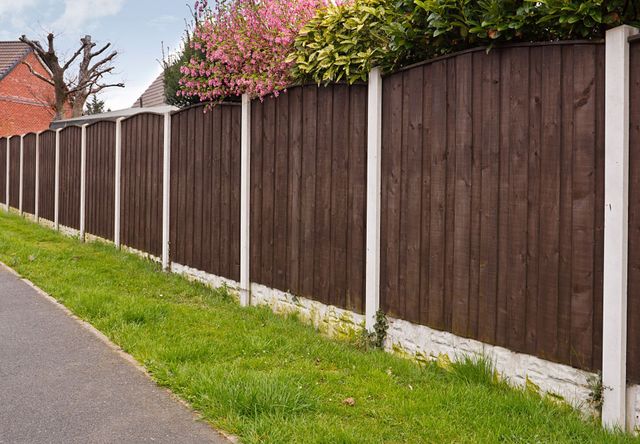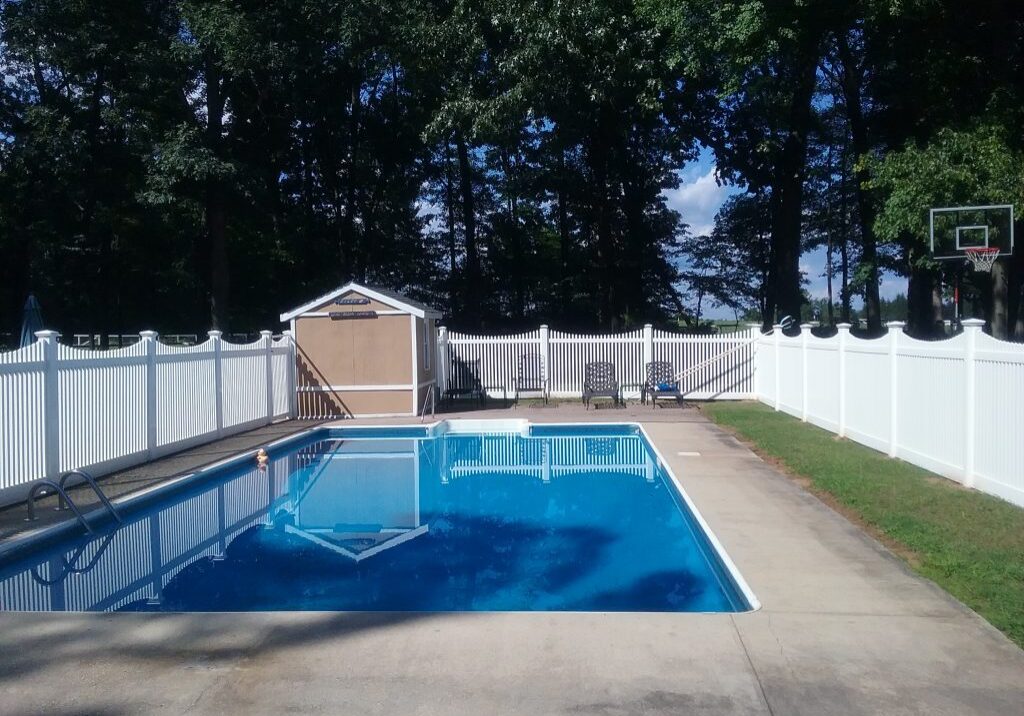All Categories
Featured
If you're thinking about setting up a fence around your property, understanding the permit needs in your area is necessary. In this guide, we'll damage down the various authorizations you may require to mount a fencing and exactly how to ensure your task remains certified with local laws.
Why Are Allows Necessary for Fence Setup? Licenses are called for to make certain that the fence you develop adheres to neighborhood building codes, zoning regulations, and safety criteria. These authorizations remain in place to shield your residential property, the buildings around you, and the setting. They guarantee that the fencing will not block energies, web traffic flow, or develop threats for pedestrians. Furthermore, they help preserve the architectural and visual integrity of your community.
![]()
Sorts Of Permits You Might Need. Structure Permit. A structure permit is one of the most usual need for installing a fencing. This permit ensures that the structure you construct abide by neighborhood safety codes and laws. You may need to get a building permit if your fence goes beyond a certain height (typically around 6 feet) The neighborhood authorities will generally review your strategies to make certain that your fencing is safe and structurally sound.
Zoning Authorization. Zoning laws govern land usage in your area, and they usually control where fences can be installed, in addition to how tall they can be. A zoning authorization makes sure that your fencing abides with these laws. Your fencing could need to be set back a certain distance from walkways or residential or commercial property lines. Zoning laws can differ by community, so it's crucial to examine the specific policies that apply to your area.
Homeowners Association (HOA) Authorization. If your home is part of a property owners association, you may require authorization before setting up a fence. HOAs often have stringent rules pertaining to the type, style, and materials used for fences to keep an uniform look throughout the neighborhood.
Specialty Permits. In many cases, you may need specialty permits based upon the area of your residential property or the nature of your fence. If your residential or commercial property is in a flood area, you may require added licenses to ensure that your fencing does not obstruct water drainage or water flow. If you prepare to develop a fencing near an eco secured area, you may require an unique authorization to comply with environmental policies.
![]()
Utility Easements and Utility Firm Approvals. Some residential or commercial properties have utility easements, which are areas assigned for utility cords, pipelines, or lines. Before mounting a fencing, you must check if your property has an easement. Constructing a fencing within an easement might interfere with utility maintenance or damages underground lines. You may need authorization from the energy business or local authorities before waging the installation.
Just How to Identify Which Permits You Required. Inspect with Local Authorities. The very first step in determining the authorizations needed is to call your local building division or zoning office. They can offer certain details about what licenses are necessary for your location. Lots of cities have on the internet resources or sites where you can check the demands or also apply for an authorization online.
Get In Touch With an Expert Fencing Contractor. A regional fence contractor is typically accustomed to the permit process and local regulations. They can aid you navigate the needs and ensure that your job is compliant. Lots of professionals also deal with the authorization application process on your part, saving you time and effort.
Evaluation Your Community's HOA Standards. Make certain to evaluate their guidelines prior to applying for any licenses if you live in an area controlled by an HOA. The HOA might need specific styles, materials, or height limitations for fencings within the neighborhood. Send your strategies to them for authorization prior to proceeding.
![]()
Repercussions of Not Getting a Permit. Installing a fencing without the called for permits can cause significant consequences. You may deal with fines, be ordered to remove the fencing, or be required to redo the installment to satisfy code demands. Furthermore, marketing your home might be made complex if the fencing doesn't satisfy neighborhood guidelines. Potential purchasers might wait to buy a property with an unpermitted fencing, specifically if it's in infraction of zoning regulations.
Final thought. Prior to installing a fencing on your residential or commercial property, make certain you understand the neighborhood regulations and acquire any kind of necessary permits. Structure authorizations, zoning permits, HOA authorizations, and specialized allows all play a crucial role in guaranteeing that your fencing is safe, legal, and certified. Putting in the time to research study and safeguard the ideal licenses will certainly conserve you from pricey mistakes and potential lawful concerns in the future. Whether you're intending a privacy fencing or an ornamental border, following these steps will assist make the installment procedure smooth and problem-free.
Why Are Allows Necessary for Fence Setup? Licenses are called for to make certain that the fence you develop adheres to neighborhood building codes, zoning regulations, and safety criteria. These authorizations remain in place to shield your residential property, the buildings around you, and the setting. They guarantee that the fencing will not block energies, web traffic flow, or develop threats for pedestrians. Furthermore, they help preserve the architectural and visual integrity of your community.

Sorts Of Permits You Might Need. Structure Permit. A structure permit is one of the most usual need for installing a fencing. This permit ensures that the structure you construct abide by neighborhood safety codes and laws. You may need to get a building permit if your fence goes beyond a certain height (typically around 6 feet) The neighborhood authorities will generally review your strategies to make certain that your fencing is safe and structurally sound.
Zoning Authorization. Zoning laws govern land usage in your area, and they usually control where fences can be installed, in addition to how tall they can be. A zoning authorization makes sure that your fencing abides with these laws. Your fencing could need to be set back a certain distance from walkways or residential or commercial property lines. Zoning laws can differ by community, so it's crucial to examine the specific policies that apply to your area.
Homeowners Association (HOA) Authorization. If your home is part of a property owners association, you may require authorization before setting up a fence. HOAs often have stringent rules pertaining to the type, style, and materials used for fences to keep an uniform look throughout the neighborhood.
Specialty Permits. In many cases, you may need specialty permits based upon the area of your residential property or the nature of your fence. If your residential or commercial property is in a flood area, you may require added licenses to ensure that your fencing does not obstruct water drainage or water flow. If you prepare to develop a fencing near an eco secured area, you may require an unique authorization to comply with environmental policies.

Utility Easements and Utility Firm Approvals. Some residential or commercial properties have utility easements, which are areas assigned for utility cords, pipelines, or lines. Before mounting a fencing, you must check if your property has an easement. Constructing a fencing within an easement might interfere with utility maintenance or damages underground lines. You may need authorization from the energy business or local authorities before waging the installation.
Just How to Identify Which Permits You Required. Inspect with Local Authorities. The very first step in determining the authorizations needed is to call your local building division or zoning office. They can offer certain details about what licenses are necessary for your location. Lots of cities have on the internet resources or sites where you can check the demands or also apply for an authorization online.
Get In Touch With an Expert Fencing Contractor. A regional fence contractor is typically accustomed to the permit process and local regulations. They can aid you navigate the needs and ensure that your job is compliant. Lots of professionals also deal with the authorization application process on your part, saving you time and effort.
Evaluation Your Community's HOA Standards. Make certain to evaluate their guidelines prior to applying for any licenses if you live in an area controlled by an HOA. The HOA might need specific styles, materials, or height limitations for fencings within the neighborhood. Send your strategies to them for authorization prior to proceeding.

Repercussions of Not Getting a Permit. Installing a fencing without the called for permits can cause significant consequences. You may deal with fines, be ordered to remove the fencing, or be required to redo the installment to satisfy code demands. Furthermore, marketing your home might be made complex if the fencing doesn't satisfy neighborhood guidelines. Potential purchasers might wait to buy a property with an unpermitted fencing, specifically if it's in infraction of zoning regulations.
Final thought. Prior to installing a fencing on your residential or commercial property, make certain you understand the neighborhood regulations and acquire any kind of necessary permits. Structure authorizations, zoning permits, HOA authorizations, and specialized allows all play a crucial role in guaranteeing that your fencing is safe, legal, and certified. Putting in the time to research study and safeguard the ideal licenses will certainly conserve you from pricey mistakes and potential lawful concerns in the future. Whether you're intending a privacy fencing or an ornamental border, following these steps will assist make the installment procedure smooth and problem-free.
Latest Posts
Discover the Best Cocktails at VUE Rooftop Bar
Published Dec 19, 24
1 min read
Explore Amazing Events at The Canyon Crest Location
Published Dec 19, 24
1 min read
What Allows Are Needed for Mounting a Fence My Location?
Published Dec 19, 24
0 min read